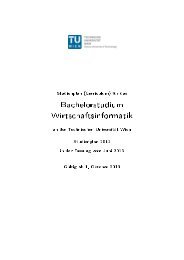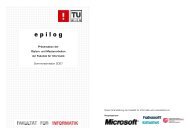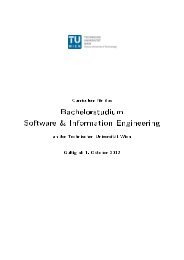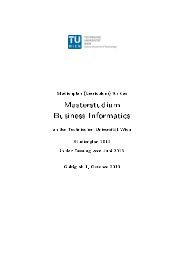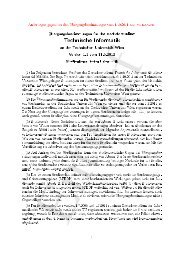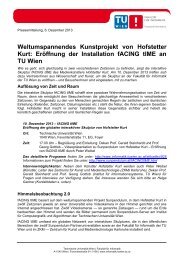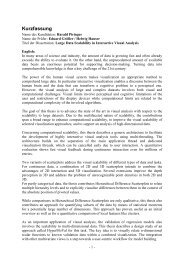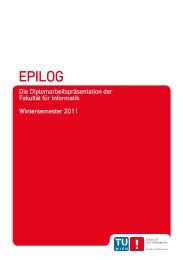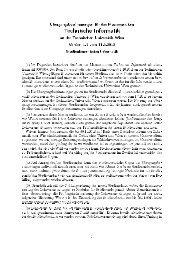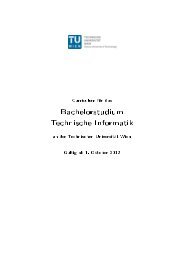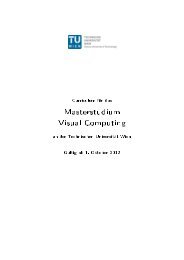Abstract-Band - Fakultät für Informatik, TU Wien - Technische ...
Abstract-Band - Fakultät für Informatik, TU Wien - Technische ...
Abstract-Band - Fakultät für Informatik, TU Wien - Technische ...
Erfolgreiche ePaper selbst erstellen
Machen Sie aus Ihren PDF Publikationen ein blätterbares Flipbook mit unserer einzigartigen Google optimierten e-Paper Software.
Institut <strong>für</strong> Computersprachen<br />
Arbeitsbereich Programmiersprachen und Übersetzer<br />
Johann Binder<br />
Introducing the XVSM Micro-Room Framework<br />
Studium: Masterstudium Software Engineering & Internet Computing<br />
BetreuerIn: Ao.Univ.Prof. Dr. Eva Kühn<br />
Nowadays, all popular online social networks in the World Wide Web are based<br />
on a client-server architecture. This leads to severe privacy issues as the<br />
provider of the online social network holds all data and could easily misuse it.<br />
Other contributions already showed how to resolve this problem by decentralizing<br />
the data with a peer-to-peer architecture. Yet these solutions have their<br />
own drawbacks, e.g. many complex technologies, bad extensibility or a lack of<br />
important privacy and security features. A cause for these drawbacks is that no<br />
satisfying high-level peer-to-peer frameworks exist, allowing users to develop<br />
complex peer-to-peer applications in an easy way. Available frameworks are<br />
rather low-level, concentrating on the communication layer. Therefore, all of<br />
the peer-to-peer online social networks analysed have been created more or<br />
less from scratch. To overcome this issue, we introduce the XVSM Micro-Room<br />
Framework which focuses on ensuring those aspects, not covered sufficiently<br />
by the existing peer-to-peer online social networks. This framework allows to<br />
create peer-to-peer applications based on configurable, shared data rooms. We<br />
then use the XVSM Micro-Room Framework for creating a proof of concept<br />
peer-to-peer online social network settled in an e-learning environment. By<br />
comparing our solutions (both the XVSM Micro-Room Framework and the<br />
generated peer-to-peer online social network) with the analysed related work,<br />
we demonstrate the benefits of our solutions regarding functionality, simplicity,<br />
extensibility, privacy and security. Finally, several performance benchmarks<br />
show the practicability of the XVSM Micro-Room Framework even in heavy-load<br />
scenarios.<br />
Andreas Brückl<br />
Relaxed non-blocking Distributed Transactions for the eXtensible Virtual<br />
Shared Memory<br />
Studium: Masterstudium <strong>Technische</strong> <strong>Informatik</strong><br />
BetreuerIn: Ao.Univ.Prof. Dr. Eva Kühn<br />
In the development of distributed applications, especially communication and<br />
coordination are complex tasks. Therefore developers are using middleware<br />
technologies which are hiding the complexity and providing enterprise features<br />
like transactions out-of-the box. Especially middlewares which are following the<br />
space-based computing (SBC) paradigm are often used for coordination tasks.<br />
41



